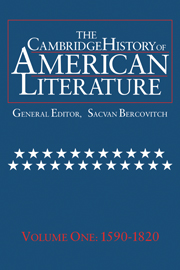Book contents
- Frontmatter
- Introduction
- THE LITERATURE OF COLONIZATION
- 1 The Papers of Empire
- 2 The Natural Inhabitants
- 3 Three Writers of Early America
- 4 Settlements
- 5 The Dispute of the New World
- 6 Traveling in America
- 7 The Final Voyage
- NEW ENGLAND PURITAN LITERATURE
- BRITISH-AMERICAN BELLES LETTRES
- THE AMERICAN ENLIGHTENMENT, 1750–1820
- THE LITERATURE OF THE REVOLUTIONARY AND EARLY NATIONAL PERIODS
- Chronology
- Bibliography
- Index
7 - The Final Voyage
from THE LITERATURE OF COLONIZATION
Published online by Cambridge University Press: 28 March 2008
- Frontmatter
- Introduction
- THE LITERATURE OF COLONIZATION
- 1 The Papers of Empire
- 2 The Natural Inhabitants
- 3 Three Writers of Early America
- 4 Settlements
- 5 The Dispute of the New World
- 6 Traveling in America
- 7 The Final Voyage
- NEW ENGLAND PURITAN LITERATURE
- BRITISH-AMERICAN BELLES LETTRES
- THE AMERICAN ENLIGHTENMENT, 1750–1820
- THE LITERATURE OF THE REVOLUTIONARY AND EARLY NATIONAL PERIODS
- Chronology
- Bibliography
- Index
Summary
Sending Farmer James to the frontier to escape the terrors of the forward march of American nationalism was an unlikely move; surprisingly, Crèvecoeur seems not to have recognized that the promise of western expansion was among the major inspirations for the Revolution. Jefferson openly regarded the territories beyond the founding states as prime development sites. The last narrative we will consider, and in many ways the definitive one, emerged from a survey he commanded of the land west of the Mississippi. The expedition to the Pacific coast that was led by Meriwether Lewis and William Clark ended the era of exploration. It did so both by crossing the continent to its far coast and by demonstrating once and for all that there was no Northwest Passage through North America to the Pacific. One motive of all the previous explorations had been to fulfill the errand of Columbus by finding such a passage. It became clear that there was none just when America itself, having become the ground of an independent nation, was confirmed as a final destination in its own right. Indeed, the United States, once established as both a separate nation and as “America,” was not only a final destination but a point of origin. With this development, Buffon's “ungenerous sky” and “empty land” metamorphosed conclusively into the endless horizon and vacant wilderness of manifest destiny.
- Type
- Chapter
- Information
- The Cambridge History of American Literature , pp. 149 - 168Publisher: Cambridge University PressPrint publication year: 1994

